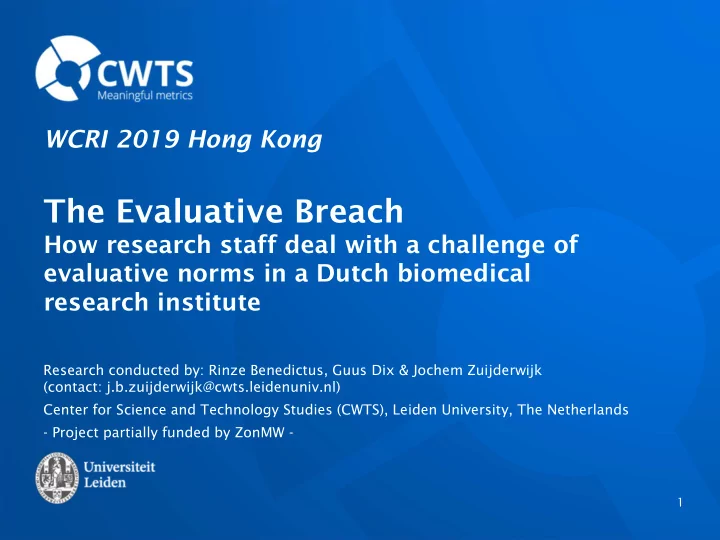

WCRI 2019 Hong Kong The Evaluative Breach How research staff deal with a challenge of evaluative norms in a Dutch biomedical research institute Research conducted by: Rinze Benedictus, Guus Dix & Jochem Zuijderwijk (contact: j.b.zuijderwijk@cwts.leidenuniv.nl) Center for Science and Technology Studies (CWTS), Leiden University, The Netherlands - Project partially funded by ZonMW - 1
Recent discussions on RI link integrity to evaluation ‘How researchers are evaluated reflects what we value most in the research enterprise and powerfully influences researchers’ behavior, including research integrity. [….]…[E]vidence implies that modifying current incentives and rewards is an important next step to optimize societal value and strengthen research integrity’ (Hong Kong Manifesto) BUT HOW? High-level statements and recommendations can mobilize people, but are not so useful for guiding realities of implementation 2
A ‘natural’ breaching experiment Case: Dutch University Medical Center 3
A ‘natural’ breaching experiment Case: Dutch University Medical Center Harold Garfinkel HOW DO ACTORS WORK TO (RE-)ESTABLISH ORDER? 4
Research design: A detailed institutional analysis • 33 Interviews – Dean, support staff, early-career and senior researchers • Two focus groups – Early career researchers – Senior researchers • Document analysis – Press statements, internal communication, minutes of internal meetings, evaluation guidelines • Fieldwork – Research group meetings, support staff meetings 5
We find three types of responses to the evaluative breach (1) Accounts of potential (2) Re-affirmative accounts (3) Accounts of uncertainty 6
Results: (1) Accounts of potential Researchers that provide accounts of potential highlight what could or has become possible in a new order: ‘I do think that it has fired up the discussion • More room for discussion whether we need to score everyone on the about what is valuable basis of: how many papers do you have? What is your H-factor?’ • More room for societal ‘...there is more and more attention for feeding our results back to patients…’ relevance • Increasing possibility that ‘ ….”what have you done for society?” […] different activities and Because you now ask people about this, they also realize: “ oh, but apparently that is forms of work will be appreciated too! ”’ recognized & rewarded 7
Results: (2) Re-affirmative accounts Researchers try to re-establish order in response to the breach through accounts that re-affirm established norms : • Indicator legitimacy: ’...But you have to be able to quantify it . Because I’ve got the idea that because it’s Specific indicators (JIF, H- still a little vague and not measurable ...[...] index), based on output …there is a lot of room for interpretation . And that actually makes it less transparent . • Evaluative standards of Look, you can say what you want about an objectivity, measurement, H-index, but it ís a hard number ’. quantifiability, transparency ‘If you want to be eligible for certain grants • Compatibility with external (…), your impact factor & H-index certainly evaluation systems still count . It’s definitely nót off the table’. • The importance of old ‘…that’s all well and good, but I simply do norms for specific positions: have to have something to tell people to aim valuing fundamental for in terms of their thesis. [….]. You need research, goals for PhDs these things to give people guidelines ’. 8
Results: (3) Accounts of uncertainty Researchers that encounter problems re-establishing a sense of order provide accounts of uncertainty : ‘… it is very unclear what you’re being • Organisational : Uncertainty judged on . There are people here that are about criteria, workload, doing fantastic work and they aren’t even opaque and subjective nominated for associate professorship’. evaluation processes ‘..... if I have to hand in a funding proposal • Field : Uncertainty about in the Netherlands or Europe tomorrow and evaluation outside UMC I’m confronted with the old evaluation norms, than this evaluation norm has only been a blip on the radar’. • Epistemic : Uncertainty about valuing basic research ‘Lets be honest. It is incredibly important to • Status : Uncertainty about do fundamental research , because without it we can never make any progress ’. the value of positions with new criteria (professors) ‘…. it devaluates professorship ’. 9
Conclusions: From a call to change to a call to experiment Accounts reveal the crucial role of researchers in maintaining old and establishing new evaluative orders There is an urgent need to: • move beyond high-level guidelines • follow reform initiatives up close and learn about best practices; avoid overambitious calls for change and interventions that neglect to address context • provide richer understandings of evaluation, organizational change & human action in RI discussion 10
Recommend
More recommend